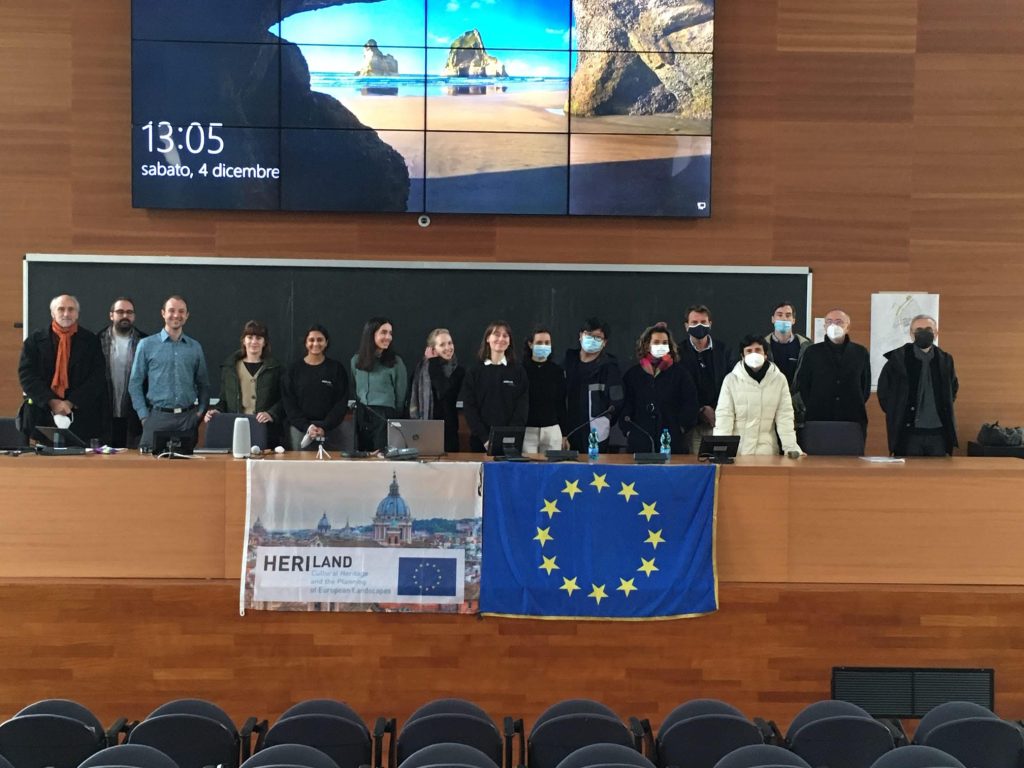By Rebecca Staats (left) & Maitri Dore (right)
Written in commission for the Journal of European Landscapes

The HERILAND College for Heritage Planning is a pan-European research and training network on cultural heritage in relation to Spatial Planning and Design. We (Maitri Dore and Rebecca Staats) are two doctoral candidates that have been part of HERILAND as early-stage researchers since the project began in October 2019. HERILAND is made up of six universities across five countries supporting fifteen PhD candidates or other early-stage researchers hosted across the participating institutions. Although we have both been completing our doctoral studies at the University of Gothenburg in Sweden, being part of HERILAND has broadened our experience as doctoral candidates through engaging with wider issues of heritage and landscape.
At its core, HERILAND aims to empower a new generation of heritage and planning professionals that are equipped to work with the challenges and complexities of sustainable landscape planning and design. To do so, HERILAND is structured around five societal challenges, organised into work packages with three early-stage researchers working within each. These five work packages are titled: The Spatial Turn; Democratisation; Digital Transformations; Shifting Demographies; Contested Identities; and Changing Environments. Although individually we complete our PhD research within a single work package (The Spatial Turn and Changing Environments respectively), being part of HERILAND has provided a welcome opportunity to engage with the issues connected to all five work packages through hands-on workshops.
Although we had intended to host the workshops at each institution in turn, the COVID-19 pandemic meant that we had shift our activities online. Despite the obvious challenges of collaborating at a distance, the workshops provided important environments to discuss at times challenging issues and push our thinking beyond our individual research projects to apply ourselves to new case studies. Having this opportunity to share and develop thinking in collaboration with other PhD candidates, in addition to receiving guidance from a wide range of supervisors involved with the project has made for a rich learning experience.
A particularly memorable experience in the project was the Living Lab that took place in Rome during November-December 2021. Aside from the thrill of finally meeting and working together in person once again, the Living Lab was an enjoyable opportunity to apply our knowledge and skills collaboratively to a case study of a district along the banks of the Tiber in Rome. The area was facing various social and economic challenges and was disconnected with the rest of the city. Working on a concrete project to address these issues enabled us to combine our different skills and backgrounds – be it architecture, urban planning or anthropology – to propose solutions focused through a heritage and landscape lens. Taking the specific spatial and cultural context into account were important elements in applying what came together as our combined approach to heritage and landscape.

The structure and composition of the program has also honed our critical thinking skills as researchers, providing opportunities to reflect on the wider social and at times political aspects of work with heritage and landscape. Through the various spatial, socio-cultural and political contexts we have examined through the workshops, we have had the opportunity to critically reflect on our responsibilities and the impact we have as researchers and practitioners. Although at times we would have welcomed the opportunity to discuss further the political aspects of our work, we have nonetheless come away with some key lessons: namely that shared understandings or values can’t be taken for granted; consensus on decisions may not always be possible; and that interventions must always be contextually appropriate taking local political, socio-cultural and economic factors into account. Finding ways to nonetheless continue working with and thinking about difficult issues has been an important aspect of the HERLAND program that has brought benefit to our individual research projects.
As the HERILAND program nears its close with the final conference in October 2022, we will take with us the collaborative opportunities and training provided by the program as we complete our individual doctoral theses at the University of Gothenburg.

